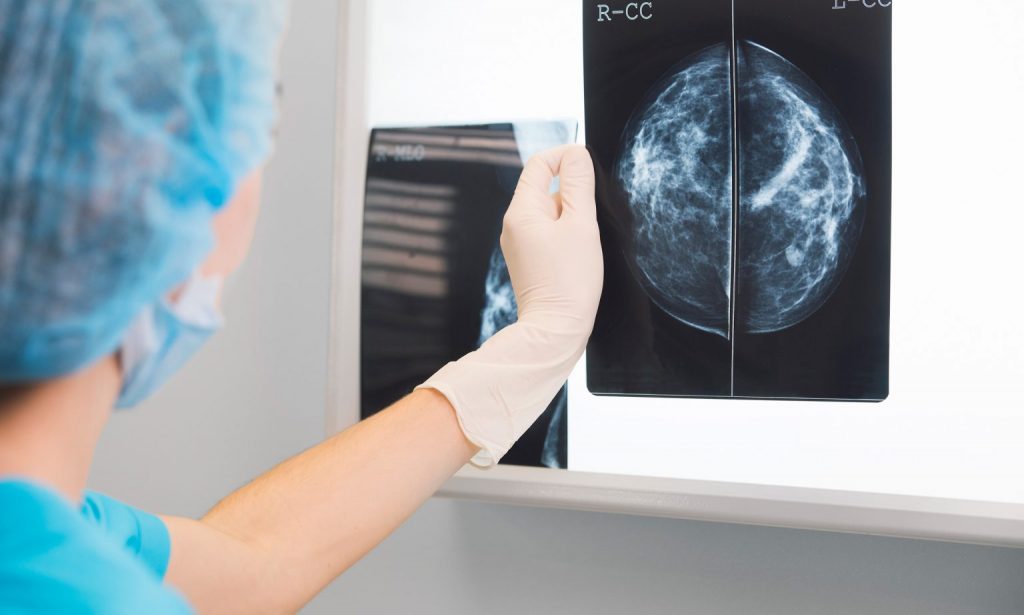Triple-negative breast cancer has a poor prognosis and limited treatment options; in non-metastatic disease the current standard of care is neoadjuvant chemotherapy, but since molecular subtyping is not performed in daily clinical practice most patients with early triple-negative breast cancer receive a neoadjuvant chemotherapy based on anthracyclines and taxanes, with treatment efficacy varying substantially across patients. A new study published on Nature Medicine shows that the chemotherapy response can be predicted by using federated learning, helping to choose adequate treatments for patients earlier.
Federated learning is a machine learning (ML) technique which allows to perform multicentric analyses without pooling data in a central repository.
In federate learning a secure and authorized software is installed in each hospital, allowing to train ML models on each local dataset and to exchange them across centers in a secure and traceable fashion and leading to the training of a single global model having indirectly seen data from all centers. As authors say, «By preserving data control and ownership for their original institutions while enabling collaboration, this approach can revolutionize biomedical research, especially for relatively rare diseases like triple-negative breast cancer, by reaching a critical mass of data sufficient to train high-quality ML models. However, the complexity of its deployment in a real-world network of hospitals has hindered its progress, and so far, federate learning studies have mostly been limited to simulations». Authors performed a federated learning analysis on triple-negative breast cancer data from two distinct hospitals using clinical informations and data from the analysis of tumor tissue to predict neoadjuvant chemotherapy response; they then compared the predictive power of federated learning models with that of local models based either on histology or on structured data used in clinical practice. Results show that ML models relying on whole-slide images can predict response to neoadjuvant chemotherapy but that collaborative training of ML models further improves performance and beside highlighting known biomarkers could also generate hypotheses on potential new biomarkers. «This proof of concept study, in which federated learning is applied to real-world datasets, paves the way for future biomarker discovery using unprecedentedly large datasets. Collaborative federated learning is a promising avenue to make novel discoveries in complex and rare diseases, such as triple-negative breast cancer, as the heterogeneity of the related cohorts offers a more accurate and complete picture than siloed studies», authors conclude.

Triple-negative breast cancer has a poor prognosis and limited treatment options; in non-metastatic disease the current standard of care is neoadjuvant chemotherapy, but since molecular subtyping is not performed in daily clinical practice most patients with early triple-negative breast cancer receive a neoadjuvant chemotherapy based on anthracyclines and taxanes, with treatment efficacy varying substantially across patients. A new study published on Nature Medicine shows that the chemotherapy response can be predicted by using federated learning, helping to choose adequate treatments for patients earlier.
Federated learning is a machine learning (ML) technique which allows to perform multicentric analyses without pooling data in a central repository.
In federate learning a secure and authorized software is installed in each hospital, allowing to train ML models on each local dataset and to exchange them across centers in a secure and traceable fashion and leading to the training of a single global model having indirectly seen data from all centers. As authors say, «By preserving data control and ownership for their original institutions while enabling collaboration, this approach can revolutionize biomedical research, especially for relatively rare diseases like triple-negative breast cancer, by reaching a critical mass of data sufficient to train high-quality ML models. However, the complexity of its deployment in a real-world network of hospitals has hindered its progress, and so far, federate learning studies have mostly been limited to simulations». Authors performed a federated learning analysis on triple-negative breast cancer data from two distinct hospitals using clinical informations and data from the analysis of tumor tissue to predict neoadjuvant chemotherapy response; they then compared the predictive power of federated learning models with that of local models based either on histology or on structured data used in clinical practice. Results show that ML models relying on whole-slide images can predict response to neoadjuvant chemotherapy but that collaborative training of ML models further improves performance and beside highlighting known biomarkers could also generate hypotheses on potential new biomarkers. «This proof of concept study, in which federated learning is applied to real-world datasets, paves the way for future biomarker discovery using unprecedentedly large datasets. Collaborative federated learning is a promising avenue to make novel discoveries in complex and rare diseases, such as triple-negative breast cancer, as the heterogeneity of the related cohorts offers a more accurate and complete picture than siloed studies», authors conclude.